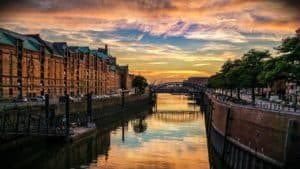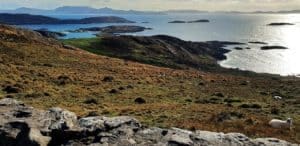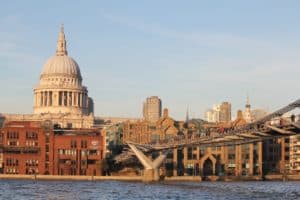Green Journeys: Eco-Tourism Rising in Ireland
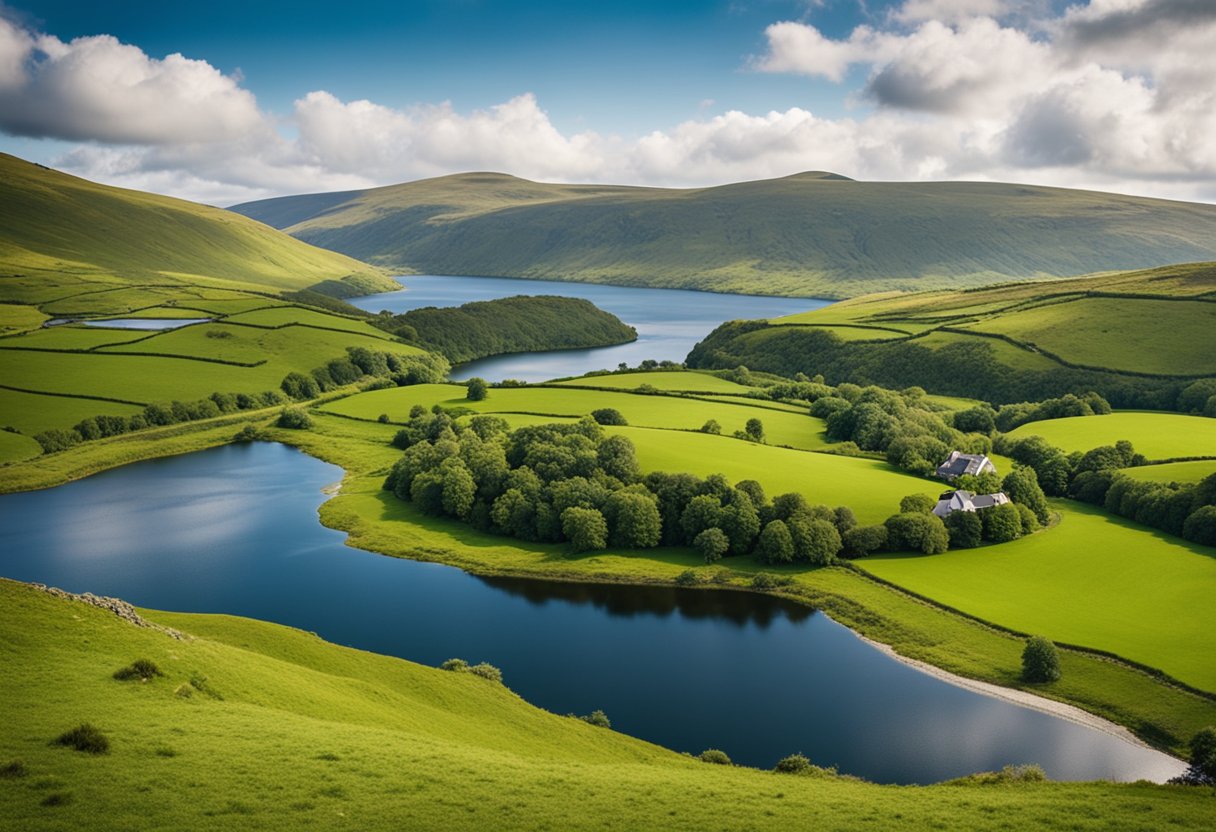
Updated On: March 20, 2024 by Maha Yassin
With the world becoming increasingly conscious of environmental issues, eco-tourism in Ireland has been on the rise, offering travellers an opportunity to responsibly explore the stunning landscapes and rich cultural heritage of the Emerald Isle. We aim to discover and enjoy Ireland’s natural beauty while minimising our impact on the environment and supporting the local communities. Sustainable tourism fosters environmental preservation and encourages local economic development through responsible travel practices.
Our journey through Ireland’s green hills and rugged coastlines is aligned with a greater global shift towards sustainable living. By choosing eco-friendly travel options and participating in eco-tourism experiences, we contribute to a form of tourism that prioritises conservation efforts, community involvement, and the promotion of a deeper understanding of natural and cultural resources. Ireland offers many options for the eco-conscious traveller, from staying in green-certified accommodations to exploring natural attractions that foreground the importance of preservation through education and direct involvement.
Understanding Eco-Tourism
Eco-tourism is a sustainable travel form that appreciates nature while contributing to conservation efforts and the welfare of local people. Let us explore its core principles, role in conservation, and how it contrasts with traditional tourism methods.
Principles of Eco-Tourism
Eco-tourism involves careful consideration of the environment and promotes sustainability. Its principles align with the leave no trace philosophy, ensuring that travellers minimise their environmental impact. Conservation is also a cornerstone; eco-tourism aids in protecting ecosystems and natural habitats through funding and raising awareness.
The Role of Eco-Tourism in Conservation
The funds generated from eco-tourism can be directed towards preserving wildlife and natural spaces. It also fosters environmental stewardship among locals and tourists, creating a collective effort to maintain the world’s biodiversity for future generations. This responsible approach to travel supports environmental conservation initiatives, such as reforestation and wildlife protection.
Eco-Tourism vs Traditional Tourism
While traditional tourism often overlooks the ecological footprint of travel, eco-tourism places a high value on reducing it. Where traditional tourism may prioritise convenience, eco-tourism precedes ecological and cultural sensitivity. This distinction ensures that eco-tourism supports the environment’s long-term vitality, contrasting with the sometimes unsustainable practices in conventional tourism.
Ireland’s Natural Heritage
In exploring Ireland’s robust efforts towards eco-tourism, it’s essential to recognise the country’s natural heritage, which plays a pivotal role in its green initiatives. Ireland boasts a rich tapestry of biodiversity and protected areas, each contributing to preserving its unique landscape and wildlife.
Wildlife and Biodiversity
Ireland’s wildlife and biodiversity are integral to our national identity. Across the island, you’ll find a multitude of habitats home to an array of species. Our rolling green hills provide pastures for land mammals, while the surrounding seas teem with marine life. The sky above thrums with the wings of numerous bird species. From the Hiberno-Norman horses known for their agility to the Irish hare, unique in its genetic makeup, our fauna reflects the country’s distinct ecosystem.
Our flora is just as significant, with native plants like the Sessile Oak and the Bog Rosemary found in our woodlands and peatlands. These species are not just beautiful, but they also support our wildlife by providing food and shelter.
Protected Areas and National Parks
Numerous protected areas and national parks have been established as part of our commitment to preserving Ireland’s natural heritage. These sanctuaries are critical for maintaining the health of our ecosystems and offer refuge for our diverse species. For example, Connemara National Park spans nearly 3,000 hectares of scenic mountains and expanses of bogs, heaths, grasslands, and woodlands. It’s a haven for nature enthusiasts and a prime example of Ireland’s wild beauty.
Similarly, the Burren National Park is renowned for its karst landscape and unique floral composition, with an array of Arctic, Alpine and Mediterranean plants coexisting. This unusual juxtaposition of flora alongside its rich archaeological heritage makes it a key player in our mission towards eco-tourism and nature conservation.
By safeguarding these areas, we not only protect our heritage but also enhance the biodiversity vital for sustainable living and promoting eco-tourism in Ireland. Our protected landscapes ensure that future generations can enjoy and learn from Ireland’s natural beauty.
Sustainable Practices in Irish Tourism
Ireland’s commitment to ecological preservation is evident in the innovative sustainable practices within its tourism sector. Recognising the crucial interplay between a healthy environment and a thriving tourist industry, we’ve observed Ireland integrating sustainability across various aspects of travel and hospitality.
Renewable Energy Initiatives
Renewable energy is at the forefront of Ireland’s green transformation. In particular, numerous accommodations and tourist attractions harness renewable energy sources like solar and wind power. From hotels installing solar panels to generate clean electricity to heritage sites utilising wind energy for their operations, these initiatives help reduce carbon footprints and exemplify sustainable practices.
Waste Management Strategies
Effective waste management has become a pillar in reducing the environmental impact of tourism in Ireland. Many tourism enterprises have adopted comprehensive recycling programs and invested in waste-reduction technologies. In places like eco-friendly hotels, visitors will notice well-marked recycling bins and staff trained in waste minimisation techniques, ensuring a minimal environmental impact during their stay.
Local and Organic Food
Ireland’s tourism industry supports sustainability and the local economy by emphasising local and organic food. Restaurants pride themselves on sourcing ingredients from local farms engaging in sustainable farming practices, offering dishes that reflect the richness of Ireland’s agricultural heritage. This not only reduces the carbon footprint associated with food transportation but also showcases Ireland’s commitment to sustainability by offering visitors a taste of the freshest, seasonal produce available.
Eco-Friendly Travel Options
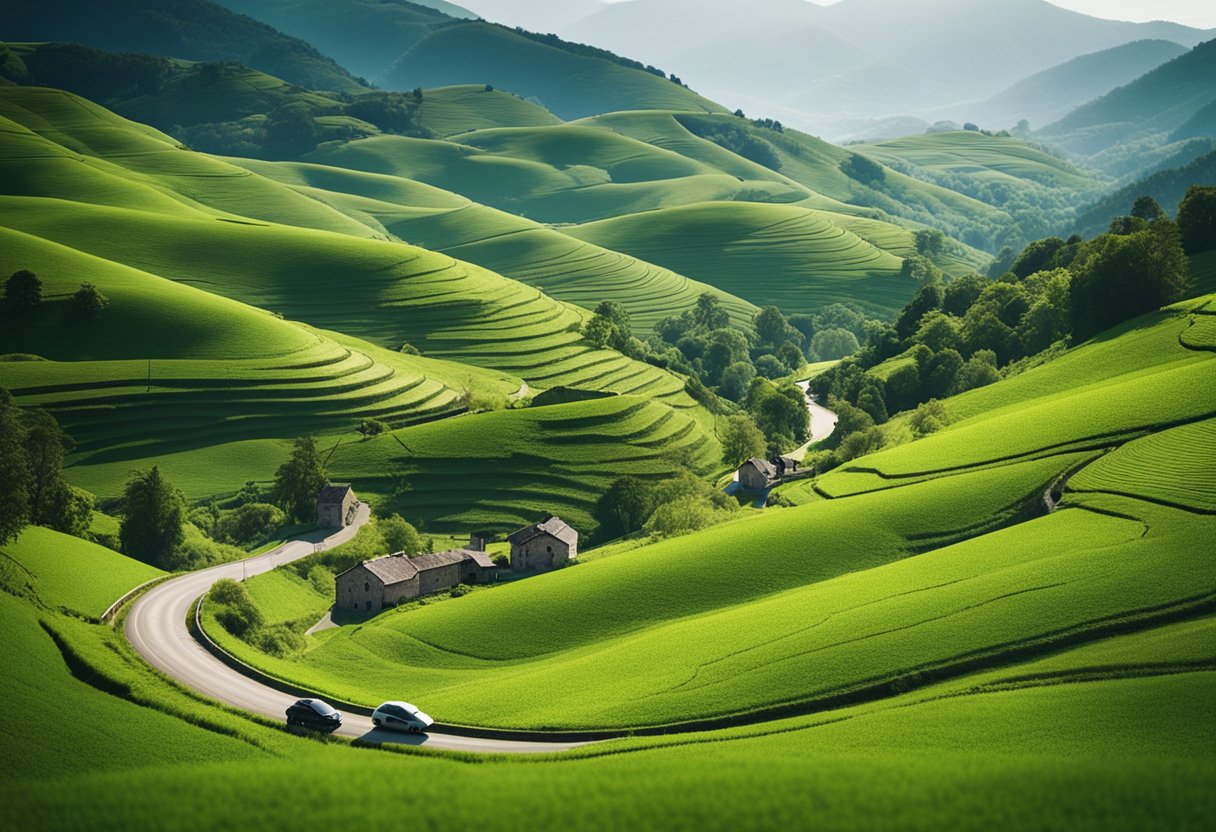
In this section, we’ll explore the eco-friendly travel options in Ireland that align with a greener approach to exploring our scenic landscapes and vibrant cities.
Public Transport Innovations
Ireland’s commitment to sustainable tourism is evident in its investments in public transport. The train network, Irish Rail, offers an extensive service connecting major cities and regional towns while providing scenic routes showcasing Ireland’s natural beauty. These eco-friendly journeys are more than just a mode of transit; they’re gateways to Ireland’s heartlands with minimal environmental impact.
Cycling and Walking Paths
Ireland’s countryside and cityscapes are interconnected through purpose-built cycling and walking paths. These paths offer a carbon-neutral way to travel and provide immersive experiences, allowing us to engage with the environment and local communities directly. The Mayo Greenway and the pathways criss-crossing the Burren capture the essence of eco-friendly exploration.
Electric Vehicle Rentals
Electric vehicle rentals are an increasingly popular alternative for those who prefer private transport. Several car rental companies across Ireland are expanding their fleet of electric vehicles, allowing us to enjoy the comfort of personal travel without the carbon footprint associated with traditional car rentals. This initiative supports Ireland’s green travel ethos, contributing to a more sustainable future.
Eco-Tourism Destinations in Ireland
Ireland’s green landscapes and commitment to sustainability make it an ideal eco-tourism destination. Tourists can enjoy a vacation combining nature’s beauty with responsible travel practices.
County Cork Highlights
In County Cork, we’re spoilt for choice with sustainable holiday options that showcase the best of Ireland’s natural beauty. Visitors can immerse themselves in the splendour of Glengarriff Nature Reserve, a haven of tranquillity with lush vegetation and diverse wildlife. It is an exemplary model of tourism Ireland prides itself on, where you can explore at your leisure or join guided walks that educate on local ecology.
- Beara Peninsula: Offering breathtaking sea views and mountain landscapes.
- Sherkin Island: Known for its arts community and environmental initiatives.
Cork offers an array of eco-friendly activities, including:
- Organic farms visits
- Cycle tours
- Eco-lodges and green accommodations
Exploring Donegal’s Natural Beauty
Donegal’s rugged coastline and unspoilt countryside make it a top-notch sustainable holiday destination. The Slieve League Cliffs, among the highest sea cliffs in Europe, provide an exhilarating experience for hikers looking to connect with Ireland’s wild side. Responsible access to such sites ensures they remain pristine for future generations.
- Glenveagh National Park: Ideal for wildlife enthusiasts and keen walkers with its sustainable visitor facilities.
- Tory Island: Celebrated for its cultural heritage and community-led conservation efforts.
Donegal ticks all the boxes for an eco-friendly vacation:
- Guided nature walks
- Bird watching
- Supporting local artisans and producers
In both Cork and Donegal, our approach to eco-tourism encompasses the preservation of landscapes and a genuine contribution to local economies, staying true to the ethos of providing a sustainable holiday destination that aligns with the values of eco-conscious travellers.
Community Involvement and Development
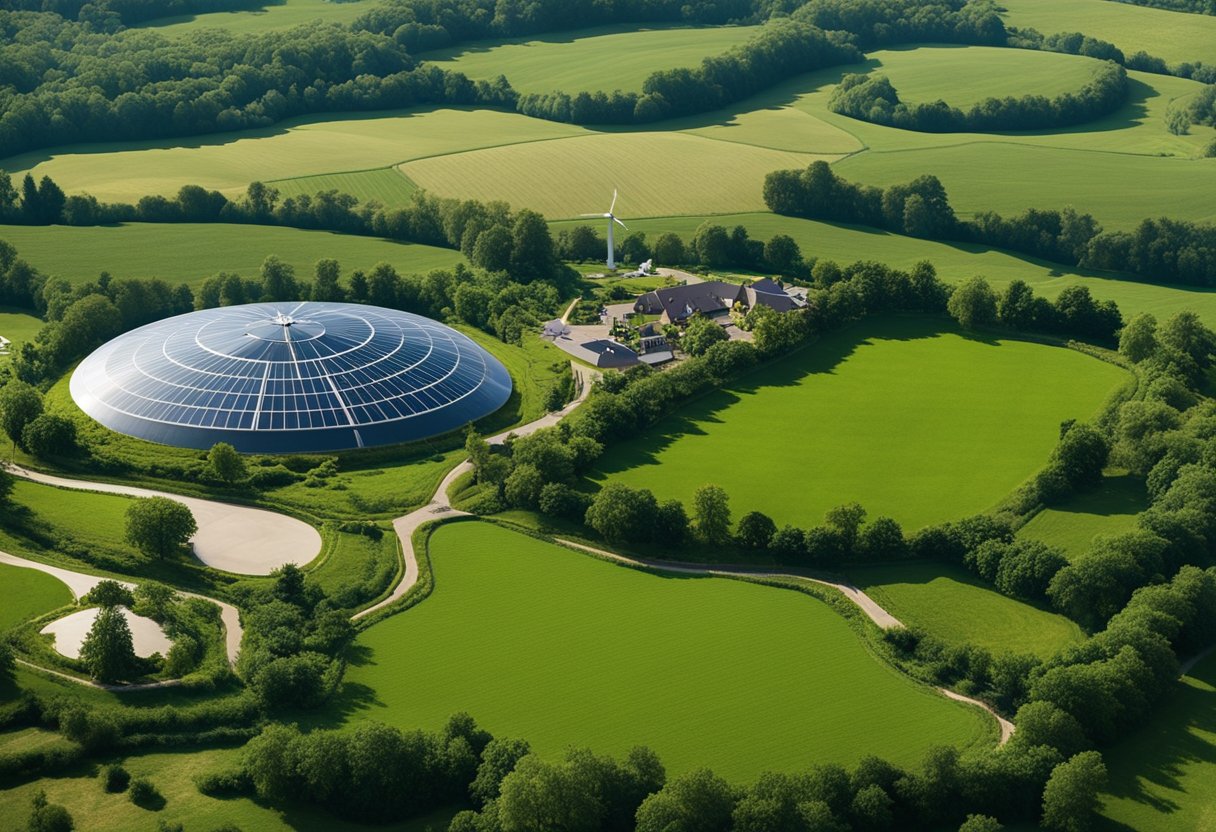
Within the realm of eco-tourism in Ireland, the pivotal role of community involvement and grassroots initiatives cannot be overstated. These elements are fundamental for fostering sustainable travel that aids in preserving local traditions and environments whilst contributing to the economy.
Supporting Local Communities
We must emphasise the importance of supporting local communities. When travellers choose to stay in locally-owned accommodations, buy locally-made crafts, or partake in tours guided by residents, they contribute directly to the economic stability of these communities. Programmes aimed at empowering local community members are crucial, ensuring not only financial benefits but also the preservation of cultural heritage.
- Staying Locally: Travellers inject money into the community by choosing accommodations like bed and breakfasts run by local families.
- Local Purchases: Buying from local artisans and small businesses supports the regional economy and helps keep traditional crafts alive.
Grassroots Tourism Programmes
Grassroots tourism programmes provide a foundation for sustainable development through hands-on involvement and education. These programmes are designed to establish a network of stakeholders who actively participate in and benefit from eco-tourism ventures.
- Educational Workshops: Community-run workshops can educate locals and visitors about environmental conservation and cultural preservation.
- Collaboration Networks: Setting up networks where information and resources can be shared among local businesses enhances the overall tourism experience while promoting sustainability.
Creating these connections is not just about economic growth; it’s about engendering a collective responsibility towards our heritage and environment, reinforcing the ties that bind us all to the beautiful Irish landscape.
Eco-Tourism Experiences
We uncover here two of the most captivating eco-tourism experiences in Ireland: an exploration of its wild habitats that brim with diverse wildlife and thrilling outdoor activities that harmonise with nature’s beauty, all while ensuring that the well-being of these natural environments remains a priority.
Wildlife Watching and Nature Tours
Nature in Ireland offers enthusiasts the unique opportunity to participate in wildlife watching and nature tours. These activities are often meticulously designed by tour operators to both delight participants and safeguard the environment. On the western seaboard, the serene Burren National Park offers guided walks elucidating the region’s unique flora and karst landscape. To the south, Killarney National Park caters to nature lovers with its exemplary initiatives to conserve biodiversity—from the native red deer to the majestic golden eagle.
- Burren National Park:
- Guided Walks
- Conservation Efforts
- Killarney National Park:
- Red Deer and Golden Eagle Sighting
- Eco-friendly Tours
Emphasising conservation, these experiences contribute significantly to personal well-being, leading to a deeper connection with nature and a profound respect for Ireland’s ecosystems.
Adventure and Sports
Adventure and sports go hand-in-hand with eco-tourism in Ireland. Environmentally conscious operators facilitate activities that leave minimal footprints on the natural world. Coasteering along the rugged Atlantic coast combines rock scrambling with sea swimming, while mountain biking in the Wicklow Mountains lets adrenaline addicts traverse the landscape with care and responsibility.
- Coasteering:
- Atlantic Coast
- Low-impact Interaction with the Sea
- Mountain Biking:
- Wicklow Mountains
- Eco-conscious Trail Use
Our collective embrace of these ventures demonstrates a commitment to sustaining Ireland’s precious natural heritage while indulging our adventurous spirits.
Challenges and Considerations

As we delve into the realm of eco-tourism in Ireland, addressing the challenges accompanying its rise is crucial. The balance we seek hinges upon mitigating environmental impacts and managing our carbon footprint, all while promoting sustainable tourism.
Addressing Over-Tourism
Over-tourism poses a significant threat to Ireland’s precious landscapes and cultural sites. Our priority is to manage visitor numbers effectively and ensure that the emissions and wear on natural attractions remain sustainable. We aim to implement strategies that distribute tourists evenly across the country, both temporally and geographically, to prevent the concentration of visitors in hotspots such as the Cliffs of Moher or the Ring of Kerry.
Balancing Tourism and Sustainability
A harmonious balance between tourism growth and sustainability is essential. We strive to promote practices that minimise carbon footprints, such as encouraging the use of public transport and supporting accommodations with green credentials. By carefully considering our actions, we can help reduce the adverse environmental impacts of travel while still offering a rich and authentic Irish tourism experience that aligns with the sustainable values we champion.
Ireland’s Green Strategy
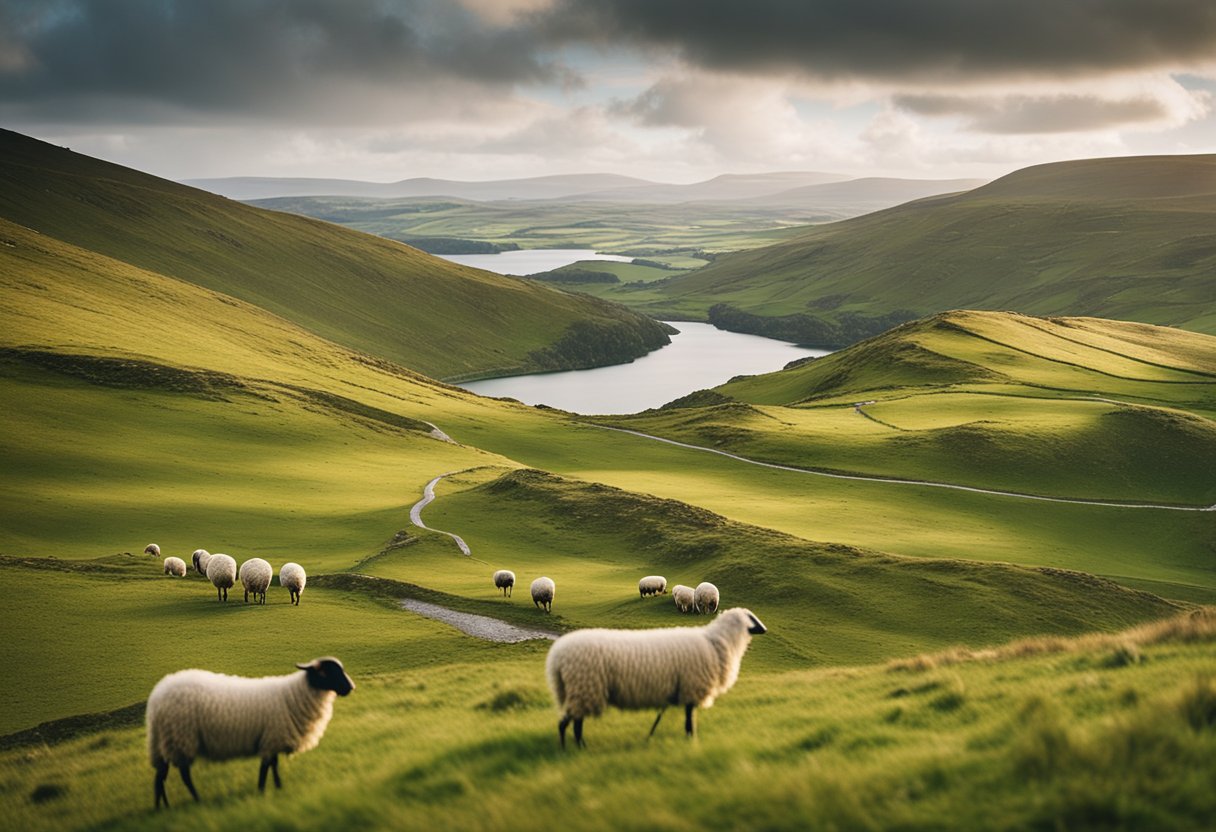
Ireland’s commitment to sustainable tourism involves a proactive approach targeting environmental conservation and community wellbeing. Our green strategy reflects our dedication to preserving the natural beauty of the Emerald Isle for future generations.
Policies and Regulations for Eco-Tourism
Ireland has implemented robust policies and regulations to ensure eco-tourism practices are effective and sustainable. These policies include initiatives to reduce single-use plastics and promote alternative materials and stringent guidelines for businesses to minimise their environmental footprint. Recognising the importance of ecological balance, the “Leave No Trace” principle has been widely adopted to preserve the pristine condition of our natural landscapes.
- Ban on single-use plastics: Aiming to cut down plastic waste, Ireland has active legislation against single-use plastics.
- Leave No Trace Ireland: Training and education programmes for businesses and tourists to promote clean and healthy outdoor ethics.
International Collaboration
Our green approach goes beyond just local efforts; Ireland actively participates in international environmental collaborations. We’ve partnered with the UK and neighbouring countries to share resources and knowledge, enhancing our overall impact. This includes joint participation in programmes aimed at solar power development and other renewable energy initiatives to ensure a greener future for tourism across borders.
- Renewable Energy Partnerships: Engaging with the UK, Ireland has invested in cross-border renewable energy projects.
- Green Awards: Celebrating excellence in sustainable practices through awards and recognition.
Sustainable Goals for Future Generations
As we consider the legacy we leave behind, our strategies must be designed to benefit the present and future generations. Ireland’s sustainable goals reflect an enduring commitment to eco-friendly practices and environmental education. Land conservation projects ensure that our rich green heritage remains intact, fostering a lasting connection with nature for tourists and locals alike.
- Conservation Initiatives: Ongoing projects to safeguard Ireland’s diverse ecosystems and cultural heritage sites.
- Education and Engagement: Focused efforts to involve communities and educate youth about the importance of green practices.
FAQs
As eco-tourism in Ireland blooms, we often receive questions about its practices, development, and principles. Here, we answer the most common queries to provide you with a clearer understanding of green travel in Ireland.
What are some notable examples of ecotourism in Ireland?
In Ireland, dedicated eco-friendly initiatives can be seen in places like Loop Head Peninsula, where sustainable practices are deeply embedded in local tourism. Accommodations like those recognised by EcoStay Ireland follow environmentally friendly guidelines to ensure a minimal ecological footprint.
How has ecotourism developed in Ireland over the years?
Ireland’s ecotourism has evolved with a growing awareness of sustainability. Organisations like Irish Experience Tours have emerged, reflecting a national commitment towards improving environmental efforts and providing green travel options.
In what ways does ecotourism differ from green tourism?
Eco-tourism specifically refers to nature-based tourism that helps conserve and support the well-being of local people. Green tourism, although similar, has a broader concept that includes sustainable practices in all kinds of travel and tourism sectors, not just those centred on nature.
Can you list countries that are considered leaders in green tourism?
Countries leading in green tourism include Costa Rica and Iceland, which are known for their robust sustainability practices. Ireland strives to join this list by adopting more eco-friendly travel options and encouraging the tourism sector to uphold sustainable practices.
What are the main principles of ecotourism that Ireland adheres to?
The main principles include minimising impact, fostering environmental and cultural awareness, providing positive experiences for all, and ensuring direct financial benefits for conservation efforts, as highlighted by Frommer’s guide to sustainable travel.
How does one ensure their travel in Ireland is eco-friendly?
Travellers can ensure their Irish journey is eco-friendly by choosing services and experiences committed to sustainability. This means staying at certified eco-accommodations, participating in conservation activities, and using transport methods that reduce carbon emissions.


